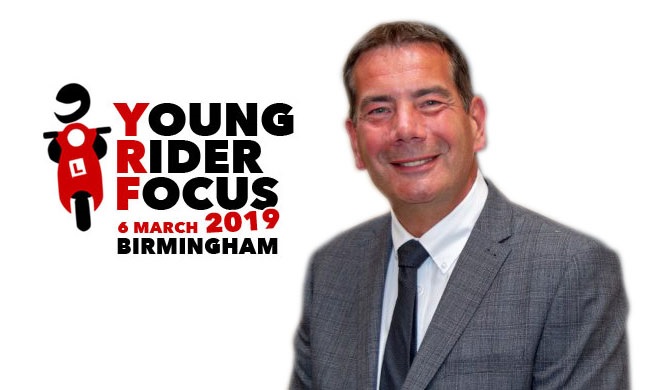
Highways England and the National Police Chiefs’ Council are the first two organisations to confirm their speakers in ‘the big picture’ session at Young Rider Focus 2019.
Organised by Road Safety GB and FirstBike, and the team behind the established Young Driver Focus conference, Young Rider Focus will be held in Birmingham on 6 March 2019.
The conference agenda is taking shape, with 14 speakers and 12 presentations now confirmed.
The big picture will comprise a series of presentations in which major key organisations will outline their ideas and initiatives to help reduce collisions and casualties involving young powered two wheeler riders.
 Highways England will be represented by Kathrine Wilson-Ellis, senior strategic programme manager – road safety, who leads on a number of projects including delivery of Highway England’s recently launched Motorcycle Safety and Transport Policy Framework.
Highways England will be represented by Kathrine Wilson-Ellis, senior strategic programme manager – road safety, who leads on a number of projects including delivery of Highway England’s recently launched Motorcycle Safety and Transport Policy Framework.
Kathy also chairs the National Motorcycle and Towing Working Groups, which are tasked with reducing the number of incidents that occur on the Strategic Road Network..
Her presentation will cover the work that Highways England and its partners are delivering to improve motorcycle safety on the road network.
Chief constable Nick Adderley from Northamptonshire Police will speak on behalf of National Police Chiefs’ Council (NPCC).
Nick Adderley joined the police service in 1992 following a successful career in the Royal Navy. Since then, he has worked for police forces in Cheshire, Greater Manchester and Staffordshire – as well as the Home Office.
In July 2018 he assumed his current post of chief constable of Northamptonshire Police.
CC Adderley is also the NPCC lead for disclosure and safeguarding – as well as police motorcycling and the criminal use of motorcycles.
Young Rider Focus
Delegate registration for Young Rider Focus is now open – with tickets priced at £125 for Road Safety GB/Academy members, £150 for attendees from public sector, third sector, academia and ADIs, and £175 (all prices plus VAT) for all other attendees.
In addition, there is the option to purchase a joint ticket covering Young Rider Focus and Young Driver Focus 2019, which takes place at the RAC Club, Pall Mall, London on 1 May 2019.
Click here to register to attend or alternatively for more information contact Sally Bartrum (delegate registration) or Nick Rawlings (conference agenda) on 01379 650112.
For more information about sponsoring and/or exhibiting at the event contact either Richard Storrs on 08451 308 853 or Rachael Butler on 07974 186445.
The problem isn’t isolated to just one group of road users. You can be the most highly trained motorcyclist in the world. You then just need to meet the most incapable of driver either coming towards you, overtaking you, or emerging from a side road as you approach that junction.
Driver & rider training is a symbiotic arrangement.
To start to reduce accidents, you must treat root cause not the after effect.
One cannot just put the onus on just PTW’s to ensure they are vigilant whilst out on the road? Society & the legal system needs to ensure that poor driving or riding skills which result in injury or fatalities to others are suitably punished.
If the driver or rider is proven to have sought to use any vehicle whilst un licensed, or uninsured, then rather than being treated as a trivial infringement as is current. If I do not have a TV license, I’m not going to kill someone by watching the 6 o’clock news? If I drive a motor vehicle on a public highway I take this ‘criminal’ avoidance to a much higher level.
As for a CBT being 3 to 5 days long? You are then putting the use of a cheap mode of transport out with the reach of many people? As currently training is a commercial concern, any additional hours need to be paid for. I think the DVSA, or the government directly should subsidies these charges.
The current minimum 2 hours on road training for a CBT is not fit for purpose. I would like to see it increased to 6 hours or ideally 8 hours solid on road riding skills development. This can be broken into 3 or 4 hour blocks, and the CBT being incorporated on to your record at the DVLA on completion of the course. It should also have a validity of a minimum of 5 years.
Sandy Allan, Aberdeen
+2
We need a major overhaul of the training being given to motorcyclists in an effort to stop the carnage that is and has occurred on our country roads and urban streets over the last 5 or 6 decades. Motorcycling has its dangers and streaming the capacity and power output of bikes by whatever method has not been and is not the answer. Any motorcyclist can be killed or injured if he puts himself into a dangerous position. Even travelling slowly himself but hit by another vehicle travelling much faster. It doesn’t matter if his vehicle puts out a mere 10 bhp or 60 bhp. Due to a lack of knowledge and training his vulnerability will not be reduced without proper training in defensive riding techniques. At least give him a 50/50 chance.
At this moment in time it takes some 40 to 60 hours of on the road training for a car driver to merely pass the DVS test and we give just 2 hour of on the road experience to a motorcyclists. Then he is left to be alone and more vulnerable on a motorcycle or scooter.
We need a lot more than just the CBT in itself. We need a minimum of at least 3 days and possibly to 5 full days training. It could be done over a period of weeks on say a 2 to 4 hourly or full day basis.
It’s done already as a 3/5 day course leading up to the DVS test anyway but it needs to be done to or for the benefit of everyone on two wheels.
There should be further courses designed and set up for back to bikers who have not ridden for any length of time. Bikes are becoming not only more and more powerful but more technological with differences in engine mappings and machine settings etc. If one gets any of these setting wrong say between fine day /track and heavy rain / wet surface, ones ride is more than likely going to end in disaster.
R.Craven
+2